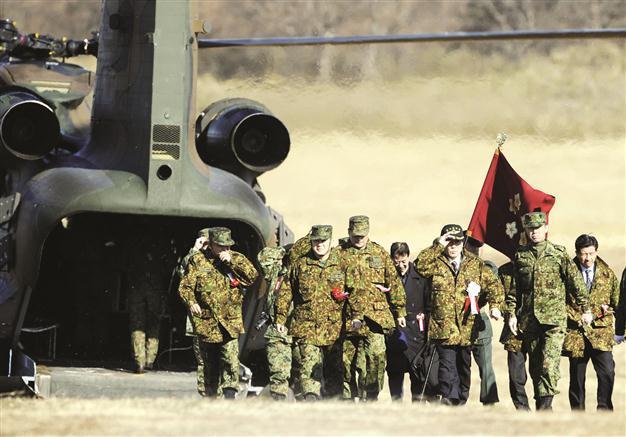Turkey, Japan may boost links in defense industry
ANKARA – Hürriyet Daily News

Japanese Defense Minister Yasuo Ichikawa (3rd R) is at the Narashino training ground to inspect the airborne troops’ drill in the Chiba prefecture on the outskirts of Tokyo. AFP photo
After Japan last month eased a self-imposed and decades-old ban on military exports, it is preparing to cooperate with Turkey in the area of defense, a senior Turkish procurement official said yesterday.“We are viewing Japan as a [key] potential country to cooperate with on defense industry matters,” the official told the Hürriyet Daily News, speaking on condition of anonymity.
“They [the Japanese] are very good on automation software, military electronics and producing naval platforms. But we have to first develop a road map. We expect to do that this year.”
Japanese Foreign Minister Koichiro Gemba was in Ankara over the weekend for talks with Foreign Minister Ahmet Davutoğlu and Economy Minister Zafer Çağlayan. Defense cooperation was briefly discussed. A senior Japanese defense team visited Turkey in the last weeks of 2011.
Regarding East Asia, Turkey already has very good defense industry cooperation with Korean War ally South Korea. The two countries are working together on the development of Turkey’s first main battle tank and are building howitzers and basic training aircraft together. Aerospace companies of the two countries may develop in the next decade a fighter aircraft dubbed “FX.”
“We want to do the same with Japan. Turkey and Japan are natural allies in the defense business,” said the Turkish procurement official.
Export path to Japan opens
On Dec. 27, 2011, Tokyo relaxed the ban on the sale of military equipment in a move that will open new markets to its defense contractors. The previous rule, adapted in 1967, banned sales to “communist states, those involved in international conflicts or subject to U.N. sanctions.” It later became a blanket ban on exports and on development of weapons with countries other than the United States, making it impossible for manufacturers to participate in multinational programs.
The relaxing of the rules does not mean Japan immediately will openly sell military products to the world. Exports will be limited to strategic allies like the United States.
Japan in December selected the U.S.-led F-35 Joint Strike Fighter Lightning II as its next-generation fighter aircraft. Turkey already is a member of the same consortium building the aircraft and last week placed an order for the purchase of two jets. Japan’s participation in the project may pave the way for Mitsubishi Heavy Industries to join in the program.
Gemba’s visit to Ankara focused mainly on Japan’s construction of a nuclear power plant in northern Turkey, which may cost up to $20 billion. Turkey first negotiated the deal with South Korea but later opened rival talks with Japan, as Ankara and Seoul failed to finalize a contract.
The Japanese deal stayed dormant for nine months after a deadly earthquake and tsunami damaged the Fukushima Daiichi Nuclear Power Plant in Japan in March last year. But now the two sides look keen to work on the matter.
Davutoğlu has expressed willingness to travel to Japan later this year to mark an agreement on the nuclear deal.
















